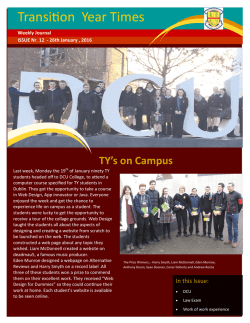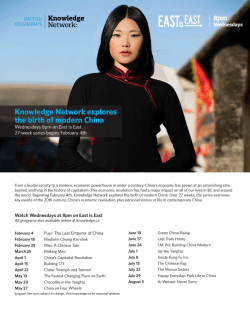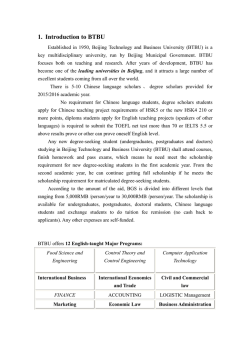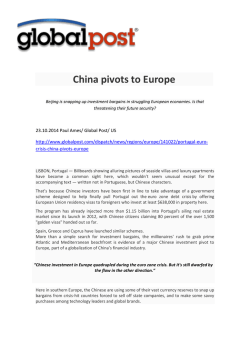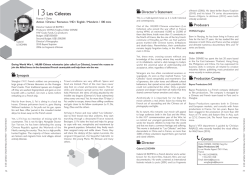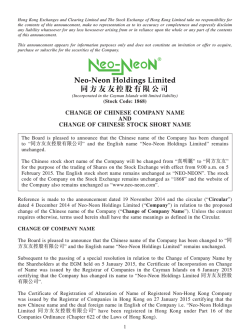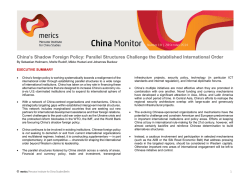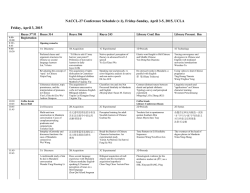
Infobaza - ORIENTplus
Driving innovation and economic growth through ORIENTplus Investments in research and development (R&D) are unanimously recognised to be key to innovation, jobs and competitiveness. Europe and China have long recognised the importance of facilitating the R&D process, with the Internet being considered a powerful transformer and key asset in their strategies to deliver such sustainable economic growth. By 2016 the digital economy is expected to contribute almost 6 and 7 percent to GDP in EU-27 and China respectively. As enablers of know-how exchange and world-class research, advanced research and education (R&E) Internet networks are one such ingredient for improving the efficiency of R&D, offering unique tools and services versus the ‘one-size fits all’ commercial Internet. The importance of dedicated research network infrastructures for international collaborations and scientific productivity is supported in the EU’s Horizon 2020 research funding programme and the Digital Agenda for Europe, as well as in the 12th Chinese Fife Year National Plan. It is recognised that investing in enabling Internet technologies and infrastructures, such as ORIENTplus and GÉANT, results in an array of mutual economic and societal benefits with positive spillover effects. ORIENTplus fosters European and Chinese participation in Big Science projects and other bandwidth-intensive research programmes to tackle global challenges, such as food security and climate change facilitates collaboration between higher-education institutions and transnational education (with China being among the top host countries), thus tackling the current student mobility imbalance between China and Europe fuels critical technological innovations and accelerates research outcomes from academia to industry by allowing knowledge to be shared between European and Chinese academic institutions and research centres helps retain highly qualified personnel and researchers able to collaborate without the need to relocate provides cost-effective connectivity and economies of scale for European and Chinese academic institutions and research centres with an intra-regional link rather than multiple links for individual projects and collaborations stimulates demand for telecommunications equipment, services and labour to operate and administer the link and creates more competitive markets More than just an Internet link ORIENTplus is the essential e-infrastructure that links over 50 million users of the pan-European GÉANT network with more than 30 million researchers, academics and students connected to the Chinese NRENs1 CERNET (China Education and Research Network) and CSTNET (China Science and Technology Network). Running between Beijing and London, the ORIENTplus link offers the shortest and fastest network route between the two regions, underpinning a wide range of data intensive or time-critical Sino-European scientific collaborations, including participation in the Large Hadron Collider (LHC) studies, as well as enabling research projects in severe weather forecasting, astrophysics, genomics and agriculture. ORIENTplus also opens new possibilities for students and academics, supporting real-time knowledge transfer through innovative e-learning tools and stable videoconferencing, overcoming the complexity of multi-cultural and interdisciplinary learning. Link capacity was quadrupled to 10 Gbps in 2013 to keep ahead of traffic growth and user demand. For many applications with a significant economic impact in the long term, such as the ITER global energy fusion programme, ORIENTplus remains the only viable solution providing high-capacity direct R&E connectivity between the EU and China. Jointly funded by the European Union’s FP7 programme, the Chinese government and Chinese and European NRENs until 2014, the ORIENTplus project is co-ordinated by research networking organisation DANTE. Seamless continuity of network connectivity between Europe and China beyond 2014 remains essential for the longer-term continuation and further development of joint research and knowledge sharing. The support of funding bodies in Europe and China is vital to ensure this essential infrastructure is maintained and further enhanced. 1 National Resarch and Education Network
© Copyright 2026
